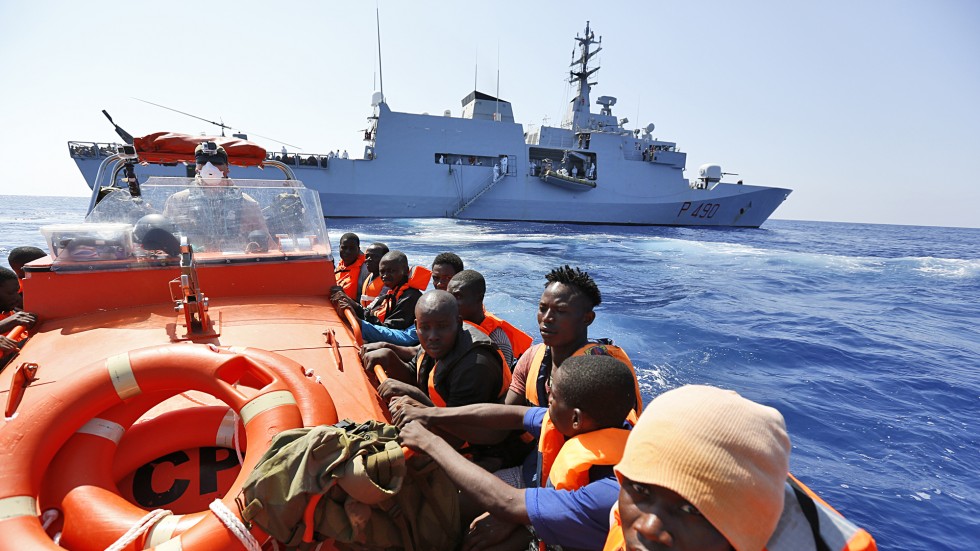
AGAINST THE CURRENT
Italian parliament debates migrant-stopping plan

Italy’s parliament will start debate today on plans to send warships to Libya to combat people-smugglers. Nearly 100,000 migrants have landed in Italy this year with no end in sight.
Announced by Prime Minister Paolo Gentiloni last week, the proposal’s details, such as the rules of engagement, will be hashed out in parliament. The plan follows a more radical proposal to extend emergency visas to migrants, allowing them to travel to other EU countries—more a threat to a non-responsive Europe than a credible policy.
Gentiloni’s European headaches intensified after Emmanuel Macron hosted competing Libyan factional leaders Paris, resulting in a ceasefire agreement. He also announced planned “hotspots” to pre-check asylum seekers. Rome was furious at not being consulted. Foreign Minister Angelino Alfano dismissed the French initiative’s influence and emphasised his support for UN-led talks.
With elections in Italy due by spring 2018, Gentiloni’s centre-left Democratic Party needs a migration breakthrough. Rising xenophobia benefits the already-resurgent right, and Alfano—leader of a small centre-right group—has ditched his coalition partner to back Silvio Berlusconi. If the ships fail, the octogenarian playboy could be ferried to a fourth stint in power.
RUSSIAN EXODUS
755 US diplomatic staff leave Russia amid sanctions retaliation

Moscow has ordered the US to cut 755 diplomatic and technical staff in Russia by 1 September, responding to newly imposed American sanctions.
As a result of the Kremlin’s measure, mostly local Russian hires are to be dismissed, leaving US diplomatic presence relatively undamaged. Nonetheless, the decimation of resources makes it harder practically for the countries to salvage their decaying relationship.
Citing the Kremlin’s actions in Syria, Ukraine and alleged interference in last year’s presidential election, Congress enshrined Obama-era sanctions against Russia in the law last week, including asset freezes and travel bans for individuals and organisations connected to President Vladimir Putin. The White House says President Trump, who has often called for decreased tensions, will sign the bill into law.
Overwhelming bipartisan support for the bill would not only override a presidential veto, but also portray Mr Trump as a Moscow-sympathiser. With Congress increasingly forcing the president’s hand on Russia, Mr Trump will have little choice but comply.
TEDIOUS TRANSACTIONS
Bitcoin infrastructure upgraded; split minimised (for now)

The world’s most popular cryptocurrency heads for a minor split today with the launch of a spinoff—Bitcoin Cash. Despite this, a larger divide has been avoided after a broad consensus was reached to upgrade transaction speed.
When making transactions, Bitcoin users must wait for “miners”—who use software to generate, or “mine” bitcoins—to approve their purchases. Because miners favour transactions with higher fees attached (which they receive), low fee transactions languish at the bottom of the queue.
To speed things up, miners have agreed to download new software that will enlarge the “blocks” used to enable transactions, effectively doubling the system’s speed. However, there was concern that many miners couldn’t afford a big upgrade. In that scenario, Bitcoin would have essentially split into two different currencies. But, a compromise was reached to use a widely-attainable modest update.
A small group wants to go further and implement even larger block sizes; that group will launch Bitcoin Cash today, believing faster transactions are necessary to become a mainstream currency. Yet, it poses a minimal threat to the original.
However, a bigger split may only be delayed—the current upgrade will not be up-to-date forever, especially if the userbase expands significantly.
HAPPENING ELSEWHERE…

South Africa’s High Court will hear an appeal by the country’s central bank against moves to force the bank to focus on the “socio-economic well-being of citizens”, rather than inflation. This recommendation was made by the country’s anti-corruption ombudsman, who suggested lawmakers change the constitution to enact the measure. Investors have grown anxious about South Africa’s economic trajectory since the firing of veteran Finance Minister Pravin Gordhan in late March; the latest court case will do little to ease their jitters.
Pakistan will get an interim prime minister: Shahid Khaqan Abbasi—a close ally of ousted PM Nawaz Sharif. Abbasi is the country’s current oil minister and, in all likelihood, will make way for Sharif’s brother once he is elected to the national legislature.
China will officially mark 90 years since the formation of its army. President Xi Jinping oversaw a 12,000-strong military parade on Sunday, which featured some new additions including the DF-31A ICBM.
Technocrats from Iran, Russia and Turkey—the three guarantors of the Astana peace process—meet in Tehran to discuss the details of de-escalation zones in Syria. The talks will lay the foundation for the sixth round of Astana talks in late August.
Tech giant Apple will report its third quarter earnings.

